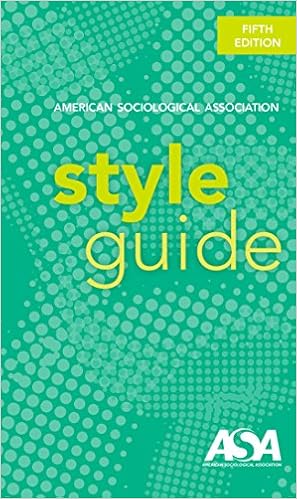American Sociological Association (ASL) Guide
What is ASA Style?
American Sociological Association (ASA) style is used for citing references in Sociology.
All information contained in this guide is based on the American Sociological Association Style Guide 6th Edition Ref. HM569.A54 2019. You will find a copy of the book at the reference desk on the main floor of the library.
The American Sociological Association (ASA) style guide is based on the 17th edition of The Chicago Manual of Style. This library guide will highlight some of the main items you might cite using ASA style. A complete list of citations can be found in the ASA Style Guide located in the Carmichael Library.
Where no rule is listed in the ASA Style Guide, you should use the Chicago Style Guide.
Quick Help
ASA Help from Purdue OWL
Referencing an Article
Print Journal Article Reference Format
LastName, FirstName, FirstName LastName, and FirstName LastName. Year. "Title of Article." Name of Publication Volume Number (Issue Number):page numbers.
Colen, Cynthia G. 2011. "Addressing Racial Disparities in Health Using Life Course Perspectives: Toward a Constructive Criticism." Du Bois Review 8(1):79-94.
Electronic Journal Article Reference Format
Journal Article with URL
LastName, FirstName, FirstName LastName, and FirstName LastName. Year. "Title of Article." Name of Publication Volume Number (Issue Number):page numbers. URL.
Demirkol, Ismail Cenk, and Mahesh K. Nalla. 2019. “How Does Police Culture Shape Officers’ Support for Community Policing?” Policing & Society 29(6):692-705. https://search.ebscohost.com/login.aspx?direct=true&db=sih&AN=137507954&site=ehost-live.
Journal Article with DOI
LastName, FirstName, FirstName LastName, and FirstName LastName. Year. "Title of Article." Name of Publication Volume Number (Issue Number):page numbers. doi: xxxx.
Demirkol, Ismail Cenk, and Mahesh K. Nalla. 2019. “How Does Police Culture Shape Officers’ Support for Community Policing?” Policing & Society 29(6):692-705. doi: 10.1080/10439463.2017.1410149.
Referencing a Book
Print Book Reference Format
LastName, FirstName. Year. Title. City of Publication: Publisher.
Bender, Wolfgang. 1991. Sweet Mother. Chicago: University of Chicago Press.
2 Authors
Edin, Kathryn, and Maria Kefalas. 2005. Promises I Can Keep: Why Poor Women Put Motherhood Before Marriage. Berkley: University of California Press.
3 to 10 Authors
Edelman, Peter, Harry J. Holzer, and Paul Offner. 2006. Reconnecting Disadvantaged Young Men. Washington, DC: Urban Institute Press.
*Note: For more than 10 authors, list the first 7 author names followed by et al.
eBook Reference Format
LastName, FirstName, and FirstName LastName. Year. Title. City of Publication: Publisher. URL.
MacDonald, Ian Thomas. 2017. Unions and the City: Negotiating Urban Change. Ithica: ILR Press. https://search.ebscohost.com/login.aspx?direct=true&db=e000xna&AN=1529584&site=ehost-live.
Referencing Newspaper and Magazine Articles
Print Newspaper/Magazine Format
LastName, FirstName. Year. "Title of Article." Newspaper/Magazine Title, Month Day, page Numbers.
Anderson, Elijah. 1994. "The Code of the Streets." Atlantic Monthly, May, 81-94.
Electronic Newspaper/Magazine Format
LastName, FirstName. Year. "Title of Article." Newspaper/Magazine Title, Month Day, page Numbers. URL.
Friedman, Thomas L. 2017. "Climate Shifts Aren't Limited to the Weather." Opinion, New York Times, April 2. https://www.newyorktimes.com/2017/08/02/opinion/climate-change.html.
Referencing a Website
Website Format - No Author
Company/Institute/Association Name. Year. "Page Title." URL.
American Anthropological Association. 1998. "AAA Statement on Race." https://www.americananthro.org/ConnectWithAAA/Content.aspx?ItemNumber=2583.
Blog Post
LastName, FirstName. Year. "Title of Article." Blog Title. Month Day. URL.
Carrigan, Mark. 2014. “Qualitative Self-tracking and the Qualified Self.” The Sociological Imagination Blog. July 31. http://sociologicalimagination.org/archives/15674.
